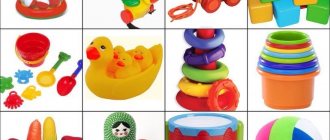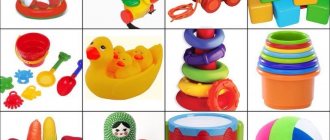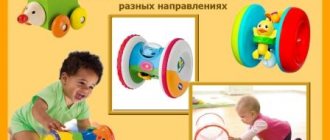Baby under one year old: “Mom, play, and I’ll watch!”
It seems to you that in the first months a newborn is only able to sleep and eat sweetly, “he has no time for games yet,” you will think, and you will be mistaken. Yes, the baby is just learning to be part of this big world, but simple, unpretentious games will help him with this.
Download our checklist and find out the most interesting intellectual games for children from 2 to 5 years old!
Age 0-6 months
Purpose of the game : development of reflexes, the five basic senses of a person.
There is no point in “entertaining” a baby at such a tender age; he is not very happy with the game yet, and you should not expect any result at all. The game is now part of the world, so new for the baby.
How to play : at this stage of development, the most ordinary things can act as a “game”: mother’s touch, stroking, conversation with the child, parents’ smiles, and even ordinary gymnastics can turn into an exciting activity, you just have to show your imagination.
Example of a simple game : as we remember, our goal is to develop the baby’s basic feelings. For example, such a simple and fun game will be useful for hearing: tie a small bell to the leg or arm of a toddler, the baby will quickly realize that the source of the interesting sound is himself, or rather his movements.
Watch the course “Nursing gymnastics for babies up to one year old” (free in ViLine.Club)
Age: 6-12 months
Purpose of the game : to teach the child to observe the game, because he is not yet able to play himself.
A six-month-old baby who occupies a predominantly horizontal position and only says “Aha!” it will be difficult to “play”; even the simplest fun is not yet available to him. Therefore, the mother will play instead of the baby, the child’s task is to be an attentive observer.
Child development up to 1 year. Let's not waste time!
How to play : At this age, it’s time to add nursery rhymes, nursery rhymes, songs and rhymes to “mom’s arsenal”. Even ordinary washing while listening to Moidodyr’s speech or feeding to “Magpie-Crow” will be exciting for the baby.
Example of a simple game : This is the very age when it’s time to remember traditional, folk “entertainment”. “Magpie-Crow” is not just a recitation of well-known rhymes, but also a reenactment of the plot: the magpie and its babies are the baby’s fingers, we bend them gradually, while cooking porridge, we stir it through the air with an imaginary spoon. It will seem to you that the child does not understand anything yet, in fact, his imagination is already working!
As you get closer to the age of one year, you can also involve the little one in the game; ask him to roll a ball, stroke a doll, and it is in the game that you teach him to hold a spoon correctly and drink from a cup. Games up to one year old have practically no “entertaining” role; this is another way for a baby to adapt to the new world.
Watch the course “Development up to a year: the race for fashion or real benefits?” (free in ViLine.Club)
Non-subject games
Hide and seek for the little ones
In addition to playing with objects, you can play simple games with your child, for example “KOO-KOO” . Such a simple game will form the child’s understanding that even if you left (hid behind your palms), you will definitely return to him and will always be there. And when the baby begins to understand that you are hiding, he will be interested in “finding” you.
Ladushki
Children really like the game “LADUSHKI”. At first, the child will clap his hands with your help, but very quickly he will learn to do it himself. Say the rhyme “Okay, okay, where have you been? By Grandma". This game helps develop your little one's motor and auditory skills. Playing repetition of sounds or facial expressions is also useful.
Faces
When your child says a sound or word, such as “aha,” REPEAT IT , this will help your child develop confidence that you understand him and are interested in him. Make funny faces at your child, children like this game, they understand that it can be very fun and funny.
Studying body parts
“LOOK” for the NOSE on the child’s face, accompanying the game with the phrases “Where is the nose?”, and when you “find it,” do not forget to explain “Here is the nose.” Play this way with different parts of the baby’s body and with objects; such a game develops attention, coordination and expands the child’s vocabulary.
Dancing
DANCE WITH YOUR BABY . Music and dancing help a child develop faster and grow into a harmonious personality. Dance around your baby yourself, and then pick him up or place him in a sling and dance as a couple. Monitor the child’s condition when he is tired and is about to sleep, just slowly circle him around the room; during moments of activity, you can throw the baby in the air, or circle him on outstretched arms. This will bring great pleasure to your baby.
One year and three months: “Mom, I play like you!”
If in the first period only the mother plays, and the baby is only able to observe, then at about the age of one year and three months the baby begins to join the game. He does not recognize it as an independent action, he only imitates his mother, acting out similar situations.
The goal of the game : to teach how to repeat not individual actions, but entire “scenarios”, because a baby can simply pick up a spoon himself, but feeding a doll is much more difficult, and therefore more interesting.
How to play : no intricate plots, it’s too early to “save” the princess from a toy dragon, now is the time to play out daily everyday processes: sleeping, eating, washing, waking up, etc.
Example of a simple game : The first “helper” will be a doll or teddy bear. “Bring to life” the toy in the eyes of the baby, show where its eyes and nose are, demonstrate how the bear dances and the doll sits on a chair. It is not individual actions that should be played out, but entire scenarios from ordinary life. The doll washed her hands, sat down at the table, began to eat porridge, the plate was empty - the porridge would have to be “invented” - and therefore the baby’s imagination works.
Do you think it’s so simple and the baby can feed the bear himself? No, he will never figure it out until you show everything in the smallest detail. Therefore, “blow on the porridge,” put a bib on the bear and wipe his mouth after eating.
Until about one year and ten months, children do not come up with the plot of a role-playing game, so they will repeat what you showed them. If you have taught how to feed a bear, then everyone without exception will be “fed”: the bunny, the dog, and the robot. At this age, it is important that toys are always at hand; do not hide them on the top shelves.
Download our checklist and find out the most interesting intellectual games for children from 2 to 5 years old!
Don't overdo it!
Dima Zitser in the book “You Can’t Cultivate Love” writes: “The habit of turning any pleasure into hard work frightens us and ultimately destroys the very meaning of this pleasure... And in family relationships this seems to manifest itself first of all. Read a book to your child? This is a whole thing... I first have to gather my strength... Shall we go for a walk? How can you let him wear what he wants? What kind of parent am I then? What about the educational function? After all, he will begin to approach life with outrageous ease... Has he finally sat down for his lessons? How can we instead do something that interests us both? After all, then, God forbid, prayer can turn into a farce. Are we playing together for once? Well, how can I avoid setting impossible tasks during the game? Otherwise, he will think that he can easily pull the fish out of the pond. They live, as you know, not for joy, but for conscience...”
Age 1, 10 months – two years: “Mom, play with me!”
The repetition period gradually gives way to independent play, though not alone, but still with mom. The child not only repeats your game script, but also makes his own adjustments to it. At this stage, he really needs verbal communication, and it is in the game that he learns to call “things by their proper names.”
Purpose of the game : To control, but not to correct, to give free rein to children's imagination, to explain every action, and not just to play it. Develop the baby’s imagination and horizons, draw his attention to the most inconspicuous things: to a flower on the street that you can smell or give to your mother, imagine how a bee lands on it, or turn into this bee yourself.
Educational games for children 1-2 years old
How to play : For this age, it is important to “master” three skills.
- The child must act out the simplest everyday scenes, the doll will eat and sleep, dress and wash - and without your help.
- Comment on your every action - first you do this, and then the child. Help your child come up with a story; at first you just collected the cubes in a truck, then he drove them. Where and why? The kid himself is unlikely to decide, tell me: the car is going to a construction site, but you can build a house out of cubes.
- The baby must understand the functions of substitute objects. It sounds complicated, but in fact, it is easy: for example, an ordinary twig can become both a spoon and a thermometer, and a simple leaf can play the role of soap or a piece of bread.
Substitute items develop imaginative thinking, but at the same time, they can “confuse” the child, and therefore do not use more than one substitute in one game. If today a cube is a chair, then let it be just that.
Example of a simple game : Once again about how to use substitute objects: you decided to feed the bunny porridge, but there was no spoon, use any stick or twig. Although, not every little one will agree to such a substitution, for example, my little son did not feed the doll with a popsicle stick, he ran to the kitchen and brought an “adult” spoon.
So, by the age of two, the baby will not only repeat the scenarios you played, but will gradually become a little director of his own games.
Two years is a kind of milestone when a child turns from an interested observer into a participant, and then into a scriptwriter of his own games. We’ll tell you further how to play with a baby after two years.
Ages from two to three years: “Mom, watch me play”
At about the age of 2 years, the baby can already occupy himself, which makes his parents very happy. Although, mom still remains an important participant. Now it’s her turn to be a spectator and sometimes a reviewer.
Purpose of the game : entertainment. It is from this age that the baby himself needs play; he “plays” and does not repeat what his mother does.
During this period, “play space” plays an important role. It’s great if the child has his own room, his own little world with toys, books and a house. The child decides for himself when to dump the entire construction set on the floor, and when it’s time to “read”, do not disturb his little “order”; the child should be the only master in his possessions.
Watch the recording of the webinar “We live, play with children. Myths and reality of children's play! (free in ViLine.Club)
How to play : The kid has already perfectly mastered simple game scenarios, but he has difficulty restoring the correct sequence. Bears and bunnies wash their hands before going to bed, and before going for a walk they may mistakenly “undress”, and not vice versa. The mother’s task is to suggest how to do it correctly, but not to reshape the plot of the children’s game.
After 2.5 years, the baby himself will become a mother, a doctor, and a salesman. This new stage can be conditionally called “the time of dialogues.” Mom constantly communicates with new people who the baby imagines himself to be.
Download our checklist and find out the most interesting intellectual games for children from 2 to 5 years old!
Example of a simple game : Buy a young doctor’s kit, hang a sign on the door with the name of the “young specialist”, place “patients” in a line in the corridor, and it’s better if these are not toys, but relatives, because you can talk to them. Teach your child to “listen” to the patient and write him a prescription, tap his knees with a hammer and do everything that he sees at an appointment at the clinic.
Playing with a partner is an important stage that a child should master by the age of three. Moreover, not only parents, but also other children should be partners. Gradually involve peers in the game, show that playing together is more fun and interesting.
So, by the age of three years, the baby will feed and treat his toys, will communicate with them, use substitute objects, and also successfully “cooperate” in play with other kids.
Watch the recording of the webinar “5 myths about early child development” (free in ViLine.Club)
Outdoor games
FOR A 1-2 MONTHS BABY, it is enough to pull a rattle-pendant or a stretcher with bright components over him in the crib. An accidental touch of hands or feet will cause a sound that will attract the baby's attention. This game will interest the child and he will try to reach the toy. This will help develop coordination of movements and will stimulate the visual and auditory system. BY 3-4 MONTHS you can change the position of the toy, and the child will follow its movement and try to get it. Move the toy from side to side, and the baby will try to reach it. But do not test the child’s patience for too long; after several attempts, give the toy to the baby’s hands. At 5-6 MONTHS, a child will be very interested in a balloon filled with helium. Tie it to the baby's hand, he will be able to move the handle and follow the movement of the floating ball. From 9-12 MONTHS, children become interested in playing with balls. Roll the ball away from you and towards your child. Accompany these actions with words like “the ball ran away from Pasha and ran to mom, and now it ran away from mom to Pasha.” Let the baby try to simply throw the ball. A little later, to play with the ball, you can connect the box and try to throw the ball into it.
As you have already seen, all the games offered are very simple, but despite this they perfectly develop and teach your child to communicate. Show your imagination and you will have a great time with your baby, and his ringing laughter will be your reward.
Ages from three to four years: time for role-playing games
Has your child memorized all your dialogues, successfully repeats them and applies them, but still cannot come up with new options? Help him, without your participation the little “director” will not be born.
The goal of the game : to teach the baby to be “like an adult,” and therefore now he plays the main role. Now he is not an ice cream buyer, but an ice cream seller, not a bus passenger, but its driver.
How to play : Now the child is in charge, but he thinks so; in fact, the “engine” of the game is still the adult. Help me come up with a story further, how to do this?
Example of a simple game : Let's imagine that you are playing kindergarten, where the child is the teacher. What should you do? Ask to eat and go for a walk, ask when classes and walks will take place. This way you can quietly tell the little teacher what to do next.
There is no need to announce a new position to the child. He must come to this himself, and little “tricks” will help - irreplaceable attributes of any profession. Offer your little one a white coat, and he will immediately realize that he is a doctor, and a car steering wheel will instantly turn him into a driver.
Outdoor games for little ones
Rule #7: The game goes round in circles
You probably know that children can ask to read the same book 500 times. It's the same with the game. Be prepared to have a decorous tea party every day for several months, and then play ice cream parlor until your throat hurts, learn all, no really all, dinosaurs that will settle on your bedroom window sill, since there is space in the nursery for Jurassic Park it won't be enough. Play your child’s favorite games, and to add variety, use rule No. 8.











